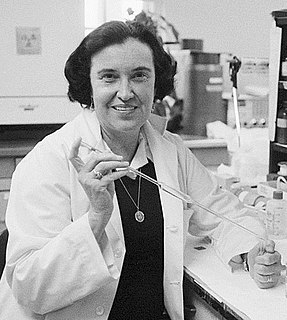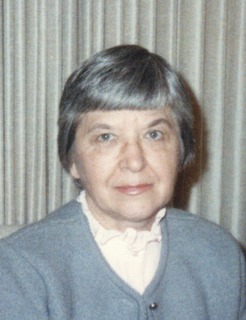Top 439 Laboratory Quotes & Sayings - Page 8
Explore popular Laboratory quotes.
Last updated on April 14, 2025.
I often think that we are like the carp swimming contentedly in that pond. We live out our lives in our own "pond," confident that our universe consists of only the familiar and the visible. We smugly refuse to admit that parallel universes or dimensions can exist next to ours, just beyond our grasp. If our scientists invent concepts like forces, it is only because they cannot visualize the invisible vibrations that fill the empty space around us. Some scientists sneer at the mention of higher dimensions because they cannot be conveniently measured in the laboratory.
A human being is not one thing among others; things determine each other, but man is ultimately self-determining. What he becomes - within the limits of endowment and environment- he has made out of himself. In the concentration camps, for example, in this living laboratory and on this testing ground, we watched and witnessed some of our comrades behave like swine while others behaved like saints. Man has both potentialities within himself; which one is actualized depends on decisions but not on conditions.
Qian Xuesen, the father of the Chinese Space Program, studied in the United States, and he was a protégé of Theodore Von Carmen's at Cal Tech and helped start the jet propulsion laboratory there, and then he got caught up in the anti-communism wave and was accused of being a spy and was actually deported back to China where he built from nothing, their entire missile and space program. So, in a way, in a very real way, the United States in trying to protect so-called protect our secrets and throwing this guy out of the country, we helped seed and start the Chinese missile program.
I love you. As the same value, as the same expression, with the same pride and the same meaning as I love my work, my mills, my Metal, my hours at a desk, at a furnace, in a laboratory, in an ore mine, as I love my ability to work, as I love the act of sight and knowledge, as I love the action of my mind when it solves a chemical equation or grasps a sunrise, as I love the things I've made and the things I've felt, as *my* product, as *my* choice, as a shape of my world, as my best mirror, as the wife I've never had, as that which makes all the rest of it possible: as my power to live.
I see on a immense scale, and as clearly as in a demonstration in a laboratory, that good comes out of evil; that the impartiality of the Nature Providence is best; that we are made strong by what we overcome; that man is man because he is as free to do evil as to do good; that life is as free to develop hostile forms as to develop friendly; that power waits upon him who earns it; that disease, wars, the unloosened, devastating elemental forces have each and all played their part in developing and hardening man and giving him the heroic fiber.
The city as a center where, any day in any year, there may be a fresh encounter with a new talent, a keen mind or a gifted specialist-this is essential to the life of a country. To play this role in our lives a city must have a soul-a university, a great art or music school, a cathedral or a great mosque or temple, a great laboratory or scientific center, as well as the libraries and museums and galleries that bring past and present together. A city must be a place where groups of women and men are seeking and developing the highest things they know.
There are two kinds of visual memory: one when you skillfully recreate an image in the laboratory of your mind, with your eyes open (and then I see Annabel in such general terms as: "honey-colored skin," "thin arms," "brown bobbed hair," "long lashes," "big bright mouth"); and the other when you instantly evoke, with shut eyes, on the dark innerside of your eyelids, the objective, absolutely optical replica of a beloved face, a little ghost in natural colors (and this is how I see Lolita).
I would say that introverts make some of the best international philosophers. The less common attribute of the introverted lifestyle - a close societal connection, as such a connection disappears or changes in relevance as the currents of the winds change - leaves too much room for one's own cultural bias. Instead, introverts tend to turn inward, the laboratory of being and all its forms. This is the most accurate study of the individual human being, which is in turn, rather than those affected by cultural limitations, the most universal reflection of human understanding and human behavior.
The purpose of any military is to kill people and break things. It's not to advance anybody's social agenda. It's not a laboratory for the left's social ideas or playgrounds. It is to kill people and break things, and the second rule is that the aggressor in any conflict sets the rules. And if they violate an existing rule book, then so be it. The aggressor sets the rules, and right now, Putin is setting the rules.
I can conceive few human states more enviable than that of the man to whom, panting in the foul laboratory, or watching for his life under the tropic forest, Isis shall for a moment lift her sacred veil, and show him, once and for ever, the thing he dreamed not of; some law, or even mere hint of a law, explaining one fact; but explaining with it a thousand more, connecting them all with each other and with the mighty whole, till order and meaning shoots through some old Chaos of scattered observations.
Many of the things that have happened in the laboratory have happened in ways it would have been impossible to foresee, but not impossible to plan for in a sense. I do not think Dr. Whitney deliberately plans his serendipity but he is built that way; he has the art-an instinctive way of preparing himself by his curiosity and by his interest in people and in all kinds of things and in nature, so that the things he learns react on one another and thereby accomplish things that would be impossible to foresee and plan.
When the first mechanical clocks were invented, marking off time in crisp, regular intervals, it must have surprised people to discover that time flowed outside their own mental and physiological processes. Body time flows at its own variable rate, oblivious to the most precise hydrogen master clocks in the laboratory. In fact, the human body contains its own exquisite time-pieces, all with their separate rhythms. There are the alpha waves in the brain; another clock is the heart. And all the while tick the mysterious, ruthless clocks that regulate aging.
When a distinguished but elderly scientist states that something is possible, he is almost certainly right. When he states that something is impossible, he is very probably wrong. Perhaps the adjective 'elderly' requires definition. In physics, mathematics, and astronautics it means over thirty; in the other disciplines, senile decay is sometimes postponed to the forties. There are, of course, glorious exceptions; but as every researcher just out of college knows, scientists of over fifty are good for nothing but board meetings, and should at all costs be kept out of the laboratory!
Perhaps the earliest memories I have are of being a stubborn, determined child. Through the years my mother has told me that it was fortunate that I chose to do acceptable things, for if I had chosen otherwise no one could have deflected me from my path. ... The Chairman of the Physics Department, looking at this record, could only say 'That A- confirms that women do not do well at laboratory work'. But I was no longer a stubborn, determined child, but rather a stubborn, determined graduate student. The hard work and subtle discrimination were of no moment.
In 1945 J.A. Ratcliffe ... suggested that I [join his group at Cavendish Laboratory, Cambridge] to start an investigation of the radio emission from the Sun, which had recently been discovered accidentally with radar equipment. ... [B]oth Ratcliffe and Sir Lawrence Bragg, then Cavendish Professor, gave enormous support and encouragement to me. Bragg's own work on X-ray crystallography involved techniques very similar to those we were developing for "aperture synthesis", and he always showed a delighted interest in the way our work progressed.
We were trying to do as much science as we could because that was the main purpose of the international space station. But without the shuttle to bring up heavy laboratory equipment and bring back samples, we were limited by what we could do, but I was proud that we actually accomplished more science that was planned for the flight. And I got a chance to do two Russian spacewalks on that flight, I had become an expert in U.S. spacewalks and using U.S. suits and techniques, and this was a chance to put on a Russian Orlan suit and do two construction space flights outside of the space station.
It seems to me that there is a good deal of ballyhoo about scientific method. I venture to think that the people who talk most about it are the people who do least about it. Scientific method is what working scientists do, not what other people or even they themselves may say about it. No working scientist, when he plans an experiment in the laboratory, asks himself whether he is being properly scientific, nor is he interested in whatever method he may be using as method.
It is very different to make a practical system and to introduce it. A few experiments in the laboratory would prove the practicability of system long before it could be brought into general use. You can take a pipe and put a little coal in it, close it up, heat it and light the gas that comes out of the stem, but that is not introducing gas lighting. I'll bet that if it were discovered to-morrow in New York that gas could be made out of coal it would be at least five years before the system would be in general use.
I was working with these very long-chain ... extended-chain polymers, where you had a lot of benzene rings in them. ... Transforming a polymer solution from a liquid to a fiber requires a process called spinning. ... We spun it and it spun beautifully. It [Kevlar] was very strong and very stiff-unlike anything we had made before. I knew that I had made a discovery. I didn't shout "Eureka!" but I was very excited, as was the whole laboratory excited, and management was excited, because we were looking for something new. Something different. And this was it.

















